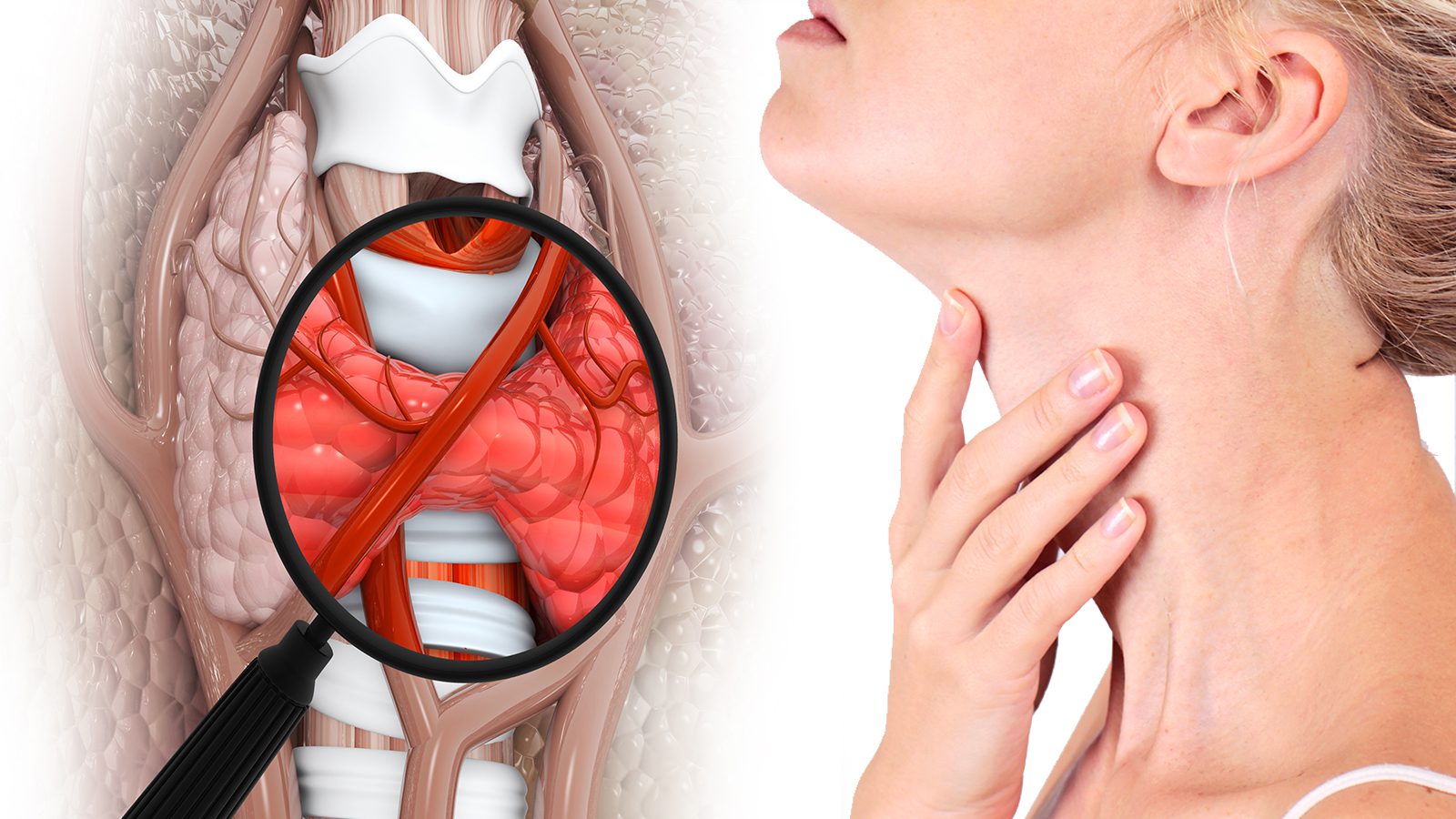Thyroid disorders include three main types.
Have you ever wondered how a teeny little gland in your neck could so significantly impact your overall health and well-being? Thyroid disorders, affecting millions worldwide, reveal the gland’s remarkable influence. Each disease, ranging from subtle to severe, may alter the body’s metabolism, energy levels, and emotional state.
Thyroid disorders, recognized for their profound health implications, have gained attention from top medical institutions, including the Cleveland Clinic. Known for its medical expertise and research, the Cleveland Clinic explains the three main types of these disorders.
Understanding the Thyroid Gland
The thyroid gland’s role in your body extends beyond its small size. It is located in the neck beneath Adam’s apple and functions like a master conductor, orchestrating various bodily functions.
This butterfly-shaped organ produces crucial hormones such as thyroxine (T4) and triiodothyronine (T3). Both of these are essential in regulating metabolism—the process that converts food into energy. These hormones don’t just control your metabolic rate; they also significantly impact various vital functions. They affect how fast your heart beats, how quickly you burn calories, brain development, digestion, and mood.
But the thyroid doesn’t work alone. Its activity is synchronized with the brain, specifically the pituitary gland and the hypothalamus. This coordination highlights the intricacy and precision of the endocrine system. If the thyroid hormone levels become imbalanced, whether too low or too high, this can lead to multiple health issues, showcasing the critical nature of maintaining thyroid health. Understanding thyroid disease complex role is key to appreciating the nuances of thyroid disorders and their broader implications on health.

Thyroid Disorders: Hypothyroidism
Hypothyroidism, commonly called a sluggish thyroid, is a condition where the thyroid gland underperforms, failing to produce sufficient thyroid hormones. This deficiency can slow your body’s metabolism, leading to various symptoms.
The most common symptoms of hypothyroidism are:
- Fatigue: Profound tiredness, even after adequate sleep.
- Weight Gain: Unexplained increase in weight, not linked to changes in diet or exercise habits.
- Sensitivity to Cold: Feeling unusually cold, even in warm environments.
- Dry Skin: Skin may become rough, dry, and pale.
- Hair Loss: Thinning hair or loss, including eyebrows.
- Slowed Mental Functions: Difficulty focusing or remembering.
- Constipation: Persistent digestive issues.
- Depression: Prolonged and unexplained mood changes.
- Menstrual Changes: Irregular or heavier menstrual cycles.
Here are the two main causes of hypothyroidism:
Hashimoto’s Thyroiditis
Hashimoto’s thyroiditis, a common cause of hypothyroidism, is an autoimmune disorder where the immune system mistakenly targets the thyroid gland. This attack leads to inflammation and damage to the thyroid, disrupting its hormone-producing capabilities.
Over time, this autoimmune reaction progressively impairs the gland’s function, decreasing thyroid hormone production.
This process can be gradual. Indeed, it may take years to develop significant symptoms. Understanding and identifying this autoimmune aspect is crucial for the effective management and treatment of hypothyroidism caused by Hashimoto’s thyroiditis.
Iodine Deficiency
Another significant cause is iodine deficiency. Iodine is crucial for thyroid hormone production. Thus, its scarcity in the diet can lead to hypothyroidism. Other causes include certain medical treatments, such as radiation therapy and certain medications, and congenital factors, where babies are born with a defective thyroid gland or no thyroid gland at all.
Understanding hypothyroidism, its symptoms, and its causes is crucial for early detection and effective management.
Thyroid Disorders: Hyperthyroidism
Hyperthyroidism is the opposite of hypothyroidism. This disorder occurs when the thyroid gland becomes overactive, producing excessive amounts of thyroid hormones. This excess accelerates the body’s metabolism, leading to symptoms that are quite distinct from hypothyroidism.
Here are the symptoms of hyperthyroidism:
- Weight Loss: Rapid weight loss despite normal or increased appetite.
- Anxiety and Irritability: Heightened nervousness, agitation, and mood swings.
- Rapid Heartbeat: Increased heart rate, palpitations, or arrhythmia.
- Tremors: Shaky hands or fingers.
- Increased Sensitivity to Heat: Overheating more easily than usual.
- Changes in Bowel Patterns: Frequent bowel movements or diarrhea.
- Goiter: Enlargement of the thyroid gland, noticeable as swelling at the base of the neck.
The causes of hyperthyroidism can include:
Graves’ Disease
In Graves’ disease, the immune system abnormally stimulates the thyroid gland. This stimulation causes the thyroid to produce excess thyroid hormones, resulting in an overactive thyroid. The mechanism involves the production of antibodies that mimic thyroid-stimulating hormone (TSH), leading to unregulated thyroid hormone production. This process can result in a range of symptoms associated with hyperthyroidism, such as rapid heartbeat, weight loss, and nervousness. Understanding this autoimmune trigger is crucial in managing and treating Graves’ disease effectively.
Developing Thyroid Nodules (Goiter)
Thyroid nodules and thyroid gland growths can be a second factor in thyroid disorders. While most are non-cancerous, they can sometimes lead to thyroid dysfunction. Depending on their nature, these nodules can produce thyroid hormones independently, leading to hyperthyroidism.
You’ve probably heard of this condition by its common name – goiter. But its scientific name is toxic nodular or multinodular goiter. Diagnosing and understanding the nature of these nodules is crucial in determining the appropriate course of treatment and managing any resulting thyroid imbalance.
Identifying and treating hyperthyroidism is crucial, as its symptoms can significantly decrease a person’s quality of life and overall health.
Thyroid Disorders: Thyroid Cancer
Thyroid cancer, though less common than other thyroid disorders, is a serious condition. It develops when cells in the thyroid undergo genetic changes (mutations) leading to uncontrolled growth. Symptoms can be subtle and are often similar to other thyroid disorders, making it challenging to diagnose.
These symptoms of thyroid cancer include the following:
- Lumps or Swelling in the Neck. These lumps are among the most noticeable signs of thyroid cancer. A doctor can feel these nodules through the skin. Typically, they are painless – people often don’t even realize they have an issue.
- Voice Changes: The disease can cause hoarseness or other changes in the voice. This occurs when cancer affects the nerves linked to the vocal cords.
- Difficulty Swallowing: As the tumor grows, it might press against the esophagus, causing discomfort or difficulty while swallowing.
- Persistent Cough: A cough that does not seem related to a cold and continues over a long period can be a subtle sign of thyroid cancer.
- Breathing Difficulties: In some cases, the tumor might press against the windpipe, leading to shortness of breath or breathing difficulties.
Early detection is crucial for effective treatment, typically involving surgery and possibly radioactive iodine therapy. Awareness and regular check-ups are emphasized for early identification and management of thyroid cancer.
Getting a Diagnosis From a Doctor
Diagnosing thyroid disorders and disease generally begins with a physical examination, where doctors look for signs like a swollen thyroid gland or symptoms of a thyroid issue. Blood tests are part of the process, measuring levels of thyroid hormones (T3, T4) and thyroid-stimulating hormone (TSH). These blood tests help the doctor determine whether the thyroid is overactive or underactive. Early diagnosis is essential for effective treatment, as thyroid disorders can lead to more severe health problems if left untreated.
Managing and Treating Thyroid Disorders and Disease
Managing hypothyroidism and hyperthyroidism could take a holistic approach focused on a healthy lifestyle:
- Dietary Adjustments: Incorporating foods rich in certain nutrients can support thyroid health. For hypothyroidism, focus on iodine, selenium, and zinc-rich foods. Reducing iodine intake can be beneficial for hyperthyroidism.
- Stress Reduction: Chronic stress can exacerbate thyroid disorders. Techniques like yoga, meditating, or practicing mindfulness can help manage stress levels, which can be especially necessary during a health scare.
- Regular Exercise: Physical activity can help regulate metabolism and overall hormone balance.
- Adequate Sleep: Ensuring sufficient sleep supports hormonal balance and overall health.
- Avoiding Environmental Toxins: It is recommended that people reduce their exposure to substances that can disrupt thyroid function, such as certain plastics and pesticides.
- Monitoring Symptoms: Regularly tracking your symptoms can help you understand how lifestyle changes impact your thyroid condition.
While these approaches can support thyroid health, they are not replacements for medical treatment in severe cases. If less-invasive management strategies don’t heal the disorder, the doctor will take a comprehensive approach. More aggressive treatment for hypothyroidism usually involves the following care:
- Hypothyroidism Treatment: A doctor might suggest hormone replacement therapy using synthetic thyroid hormones like levothyroxine to rebalance hormone levels.
- Hyperthyroidism Treatment: Options include medication to lower hormone production, radioactive iodine therapy, or surgery in certain scenarios.
- Thyroid Cancer Treatment: Beating thyroid cancer can involve surgery to remove part of or the complete thyroid gland, often followed by radioactive iodine therapy and sometimes external radiation or targeted therapy drugs, especially in advanced cases. Each treatment is customized to the individual’s needs.
Doctors tailor treatments to the individual’s specific condition and needs. Always consult with a healthcare professional for personalized advice.

Final Thoughts on the Three Types of Thyroid Disorders
Understanding thyroid disorders – hypothyroidism, hyperthyroidism, and thyroid cancer – is key to maintaining optimal health. Remember, small changes in your lifestyle can significantly impact your thyroid health. Stay attuned to your body’s signals and seek professional guidance for personalized care. Your journey to wellness starts with knowledge and proactive steps towards a healthier you.



















